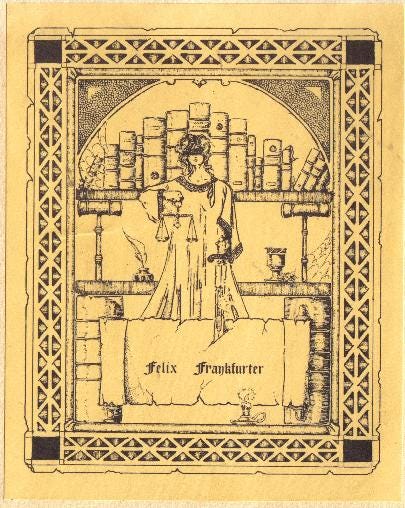More on Percy Crosby
I found an auction description I wrote when I sold my copy of “Would Communism Work Out in America?”
I didn’t realize I had cited the long passage re: Pelley, so should probably post it here.
-
Would Communism Work Out in America? by Percy Crosby. self-published Freedom Press, McLean, VA. 1938 stated First edition. 316 pages, approx 6 x 8.5 inches. Card stock covers with illus. (see scan) and centerfold illustration by Crosby. Heavy soiling (as from dust and age) to outside, pages crisp and clean inside. Corners bumped, but binding is tight. Strictly judged, Fair condition.
VG Ex Libris / Exlibris / bookplate of Supreme Court Justice Felix Frankfurter to inside front cover (name printed, see scan).
Percy Crosby was author and artist of the famous Skippy comic strip. His trademark was frankly ripped off by the peanut butter company but he never won his legal battles against them, instead being committed to an institution where he died all but forgotten. A truly tragic American figure.
This title is a sample of his personal crusading in rabid opposition to the policies of Franklin Roosevelt. Fascinating as it spends much space distancing his efforts from those of antisemites and fascists.
"There is one point which I think the veterans should know, and that is that there is a great danger looming on the horizon, namely, that the attack on Communism is taking a channel of anti-Jewish propaganda. I have received many pamphlets where the whole responsibility for the Communistic proposition is laid to the Jewish faith, and Christians, as well as every other denomination, are given a free sweep. Judging from these pamphlets which are coming to me, and one is the Pelley Press, the opposition brought against Communism is a Nazi-Fascist front which aims to make the Jews the victims of hate. This channel is increasing, and since the Communists are using any attack against them in a Fascist category, I want the veterans to realize that it is imperative, I feel, for the people to take over their government and take it over fast. I say this advisedly, for if we have a Fascist-Nazi front on one side, opposed to a Communist front on the other, the government will soon be crushed between these opposing forces," (p. 232-233).
Crosby mentions a number of political figures Donald Richberg, Rexford Tugwell, William Wirt, Senator Borah etc. and also obscure far-rightists such as George Christians of the Crusader White Shirts (portrayed here as a communist), William Dudley Pelley of the Silver Shirts and Harry Elmer Barnes.
Crosby attacks the Ku Klux Klan as he does New Deal projects such as the WPA and NRA (Works Progress Administration, National Recovery Administration et al). A venomous screed of much passion and perhaps indicative of the fanaticism which drove him to madness.
A rather scarce title of value to the historian for its contents but doubly valuable to the bibliophile for the perfect, clean example of the Ex Libris of Supreme Court Justice Felix Frankfurter. I don't know what path this book has taken over the years, but from the looks of it, it has been well-read... and likely at least thumbed through by the historical figure whose library card it bears.
(from Wikipedia)
On January 5, 1939, President Franklin D. Roosevelt nominated Frankfurter to the U.S. Supreme Court. He served from January 30, 1939 to August 28, 1962.
Despite his liberal political leanings, Frankfurter became the court's most outspoken advocate of judicial restraint, the view that courts should not interpret the fundamental law, the constitution, in such a way as to impose sharp limits upon the authority of the legislative and executive branches. In this philosophy, Frankfurter was heavily influenced by his close friend and mentor Oliver Wendell Holmes, Jr., who had taken a firm stand during his tenure on the bench against the doctrine of "economic due process". Frankfurter revered Justice Holmes, often citing Holmes in his opinions. In practice this meant Frankfurter was generally willing to uphold the actions of those branches against constitutional challenges so long as they did not "shock the conscience". Frankfurter was particularly well known as a scholar of civil procedure. Later in his career, this philosophy frequently put him on the dissenting side of ground-breaking decisions of the Warren court. However, Frankfurter was a strong foe of racial segregation and joined the Court's unanimous opinion in Brown v. Board of Education (1954), which prohibited segregation in public schools. Frankfurter encouraged the Morgenthau Plan against Germany in World War II.





